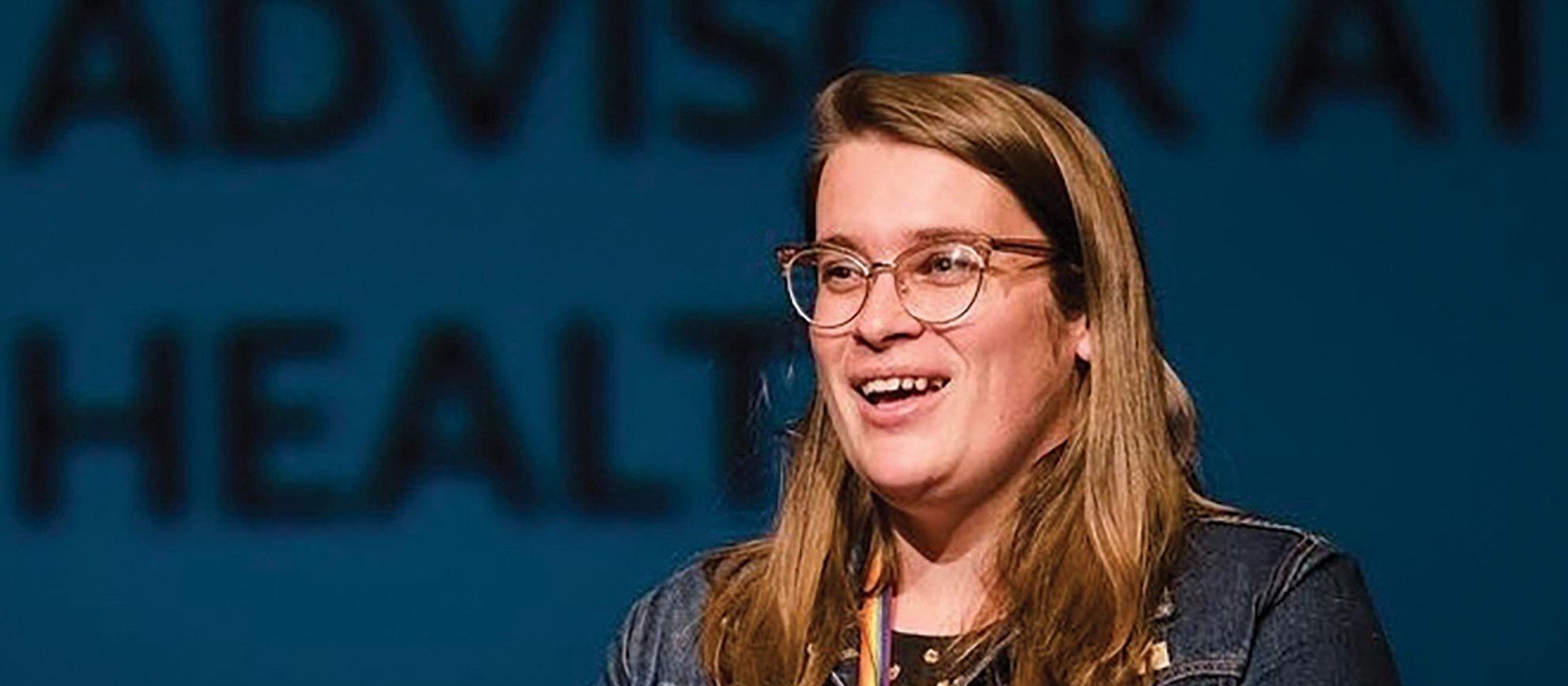Respiratory physician Lutz Beckert considers chronic obstructive pulmonary disease management, including the prevention of COPD, the importance of smoking cessation and pulmonary rehabilitation, and the lifesaving potential of addressing treatable traits. He also discusses the logic of inhaler therapy, moving from single therapy to dual and triple therapy when indicated, as well as other aspects of management
Pegasus steps up with rainbow care
Pegasus steps up with rainbow care

Primary care for LGBTQ+ patients in Canterbury is having its eyes opened to the needs of the rainbow community, writes Maia Hall
A partnership between LGBTQ+ organisation Qtopia and PHO Pegasus Health is making Canterbury one of the best places to access gender-affirming healthcare, says Qtopia healthcare lead Jennifer Shields.
The partnership is fostering inclusive workplace competence training, rainbow health pathways and support services, and collaboration on a youth gender and sexuality educational app.
Ms Shields spends one day a week as Pegasus’ rainbow people health & wellbeing advisor in a year-long contract. She says the project has been a success and other PHOs could follow.
Offering LGBTQ+ and gender-affirming care within primary care is international best practice, says Ms Shields. One of the partnership’s aims is to equip health professionals to offer great healthcare to rainbow individuals without having to refer to specialists.
The biggest barrier to inclusive care, says Ms Shields, is lack of information.
Qtopia runs a professional development programme for anyone who wishes to better support rainbow people in their environment.
The organisation works with medical students but it’s often just one hour of learning, “and that’s usually the only rainbow competency training they get”, Ms Shields says.
“We’re still churning out doctors and healthcare professionals who don’t really have much in the way of knowledge about what the rainbow communities’ needs might be and how to support them.”
In the survey Counting Ourselves, created for trans and non-binary people in Aotearoa, 36 per cent of participants had avoided seeing a doctor because they were worried about disrespect or mistreatment as an LGBTQ+ person.
Visibility is a big factor in LGBTQ+ healthcare, Ms Shields says.
“If our community are not even walking in the doors to their practice, I suggest ways to break down that barrier”, she says. An example is an “inclusion statement” on the practice’s website. “It can be as simple as ‘so-and-so is an inclusive practice’, we want patients from all communities including the rainbow, gender-diverse, Māori and Pacific, disabled communities’”.
Ms Shields says ensuring LGBTQ+ safety is all about a wrap-around patient experience.
As soon as the patient enters the practice, they’re looking around to see whether they’re reflected in that space, checking for visual signals of whether it’s a safe space for them to share who they are.
The patient then interacts with a receptionist, so the receptionist needs some inclusive competency training.
For the GP, there is another sphere of rainbow inclusion and competency requirements, she says.
Alongside Qtopia’s staff training, Ms Shields recommends practices reach out to rainbow groups in their area and make the most of online resources.
“For gender-affirming care in particular, we always recommend doctors reach out and join PATHA – Professional Association for Trans Health Aotearoa.”
All Pegasus general practices have access to funded rainbow inclusion training with Qtopia.
Ms Shields says training sessions are part of an ongoing relationship: “We never just do a one-off workshop, we always go right in and walk alongside them to provide ongoing support.”
Pegasus Health is developing a rainbow-focused gender and sexuality educational app for young people, in a collaborative project with the University of Canterbury.
When asked to give feedback, Ms Shields was “blown away”. “The breadth of content it has in terms of the issues it covers…it is going to be such a great resource,” she says.
An app of this nature for takatāpui and rainbow rangatahi “is all about making sure they can see themselves reflected in the content,” she says.
Ms Shields says that much of the sex and gender education young people receive talks about healthy relationships and safe sex from a heteronormative point of view.
“We know from the young people we work with that they often leave [school sex education lessons], with zero modelling for what a healthy queer relationship looks like.”
The app, which will be called Te Puāwaitanga: Beyond the Birds and the Bees will use as much neutral language as possible, while also giving explicit examples of rainbow relationships.
Qtopia has been around for about 25 years under several different names. Including Ms Shields, the charity employs three permanent staff members and manages a team of volunteers.
Qtopia and Ms Shields have had a working relationship with Pegasus Health since 2017 and have worked on codesign programme Ko Awatea to codify access to genderaffirming care in Canterbury.
They have introduced a “Transgender Health” section for the Canterbury Community HealthPathways and provided content for services such as Health Info Waitaha Canterbury.
We're publishing this article as a FREE READ so it is FREE to read and EASY to share more widely. Please support us and the hard work of our journalists by clicking here and subscribing to our publication and website







![Barbara Fountain, editor of New Zealand Doctor Rata Aotearoa, and Paul Hutchison, GP and senior medical clinician at Tāmaki Health [Image: Simon Maude]](/sites/default/files/styles/thumbnail_cropped_100/public/2025-03/Barbara%20Fountain%2C%20editor%20of%20New%20Zealand%20Doctor%20Rata%20Aotearoa%2C%20and%20Paul%20Hutchison%2C%20GP%20and%20senior%20medical%20clinician%20at%20T%C4%81maki%20Health%20CR%20Simon%20Maude.jpg?itok=-HbQ1EYA)
![Lori Peters, NP and advanced health improvement practitioner at Mahitahi Hauora, and Jasper Nacilla, NP at The Terrace Medical Centre in Wellington [Image: Simon Maude]](/sites/default/files/styles/thumbnail_cropped_100/public/2025-03/2.%20Lori%20Peters%2C%20NP%20and%20advanced%20HIP%20at%20Mahitahi%20Hauora%2C%20and%20Jasper%20Nacilla%2C%20NP%20at%20The%20Terrace%20Medical%20Centre%20in%20Wellington%20CR%20Simon%20Maude.jpg?itok=sUfbsSF1)
![Ministry of Social Development health and disability coordinator Liz Williams, regional health advisors Mary Mojel and Larah Takarangi, and health and disability coordinators Rebecca Staunton and Myint Than Htut [Image: Simon Maude]](/sites/default/files/styles/thumbnail_cropped_100/public/2025-03/3.%20Ministry%20of%20Social%20Development%27s%20Liz%20Williams%2C%20Mary%20Mojel%2C%20Larah%20Takarangi%2C%20Rebecca%20Staunton%20and%20Myint%20Than%20Htut%20CR%20Simon%20Maude.jpg?itok=9ceOujzC)
![Locum GP Helen Fisher, with Te Kuiti Medical Centre NP Bridget Woodney [Image: Simon Maude]](/sites/default/files/styles/thumbnail_cropped_100/public/2025-03/4.%20Locum%20GP%20Helen%20Fisher%2C%20with%20Te%20Kuiti%20Medical%20Centre%20NP%20Bridget%20Woodney%20CR%20Simon%20Maude.jpg?itok=TJeODetm)
![Ruby Faulkner, GPEP2, with David Small, GPEP3 from The Doctors Greenmeadows in Napier [Image: Simon Maude]](/sites/default/files/styles/thumbnail_cropped_100/public/2025-03/5.%20Ruby%20Faulkner%2C%20GPEP2%2C%20with%20David%20Small%2C%20GPEP3%20from%20The%20Doctors%20Greenmeadows%20in%20Napier%20CR%20Simon%20Maude.jpg?itok=B0u4wsIs)
![Rochelle Langton and Libby Thomas, marketing advisors at the Medical Protection Society [Image: Simon Maude]](/sites/default/files/styles/thumbnail_cropped_100/public/2025-03/6.%20Rochelle%20Langton%20and%20Libby%20Thomas%2C%20marketing%20advisors%20at%20the%20Medical%20Protection%20Society%20CR%20Simon%20Maude.jpg?itok=r52_Cf74)
![Specialist GP Lucy Gibberd, medical advisor at MPS, and Zara Bolam, urgent-care specialist at The Nest Health Centre in Inglewood [Image: Simon Maude]](/sites/default/files/styles/thumbnail_cropped_100/public/2025-03/7.%20Specialist%20GP%20Lucy%20Gibberd%2C%20medical%20advisor%20at%20MPS%2C%20and%20Zara%20Bolam%2C%20urgent-care%20specialist%20at%20The%20Nest%20Health%20Centre%20in%20Inglewood%20CR%20Simon%20Maude.jpg?itok=z8eVoBU3)
![Olivia Blackmore and Trudee Sharp, NPs at Gore Health Centre, and Gaylene Hastie, NP at Queenstown Medical Centre [Image: Simon Maude]](/sites/default/files/styles/thumbnail_cropped_100/public/2025-03/8.%20Olivia%20Blackmore%20and%20Trudee%20Sharp%2C%20NPs%20at%20Gore%20Health%20Centre%2C%20and%20Gaylene%20Hastie%2C%20NP%20at%20Queenstown%20Medical%20Centre%20CR%20Simon%20Maude.jpg?itok=Z6u9d0XH)
![Mary Toloa, specialist GP at Porirua and Union Community Health Service in Wellington, Mara Coler, clinical pharmacist at Tū Ora Compass Health, and Bhavna Mistry, specialist GP at Porirua and Union Community Health Service [Image: Simon Maude]](/sites/default/files/styles/thumbnail_cropped_100/public/2025-03/9.%20Mary%20Toloa%2C%20Porirua%20and%20Union%20Community%20Health%20Service%20in%20Wellington%2C%20Mara%20Coler%2C%20T%C5%AB%20Ora%20Compass%20Health%2C%20and%20Bhavna%20Mistry%2C%20PUCHS%20CR%20Simon%20Maude.jpg?itok=kpChr0cc)